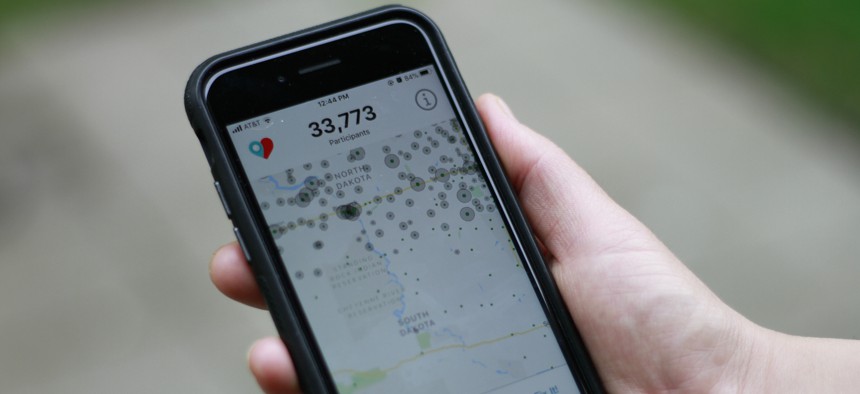Local Rollout of Contact Tracing Apps Can Help Combat Skepticism, Experts Say

The Care19 app is seen on a cell phone screen, Friday, May 22, 2020, in Sioux Falls, S.D. Care19, a contact tracing app is being pushed by the governors of North Dakota and South Dakota as a tool to trace exposure to the coronavirus. AP Photo/Stephen Groves
The smartphone technology can be useful for notifying people who’ve come in contact with someone infected with the coronavirus, but getting people to download the apps is proving to be a challenge.
A handful of states have deployed contact tracing apps to notify residents of potential exposure to Covid-19 as a method to help stop the spread of the virus. But with many Americans distrustful of the technology, only a small percentage of residents in those states have downloaded the smartphone apps, undermining their usefulness.
Because it may prove difficult to convince large segments of the general population to use the apps, technology and public health experts said it may be more effective for local governments or universities to target the apps specifically to their communities to achieve a higher density of app usage.
“If you can get 80% of a university community to install this app, then that works within the community. All the exposures that occur within the university will be discovered much more quickly,” said Brian McClendon, the CEO and co-founder of the CVKey Project, a non-profit designing health apps. “The ones that happen in the rest of the town, maybe not so much. But there is an opportunity for individual communities to bring their members in.”
The number of confirmed coronavirus infections in the United States topped 3 million this week. For every infected person, contact tracers must typically reach out to 20 to 25 people who were in proximity to the person, making it difficult to rely on manual tracing methods alone, health officials told a U.S. House of Representatives committee on Wednesday. By augmenting traditional contact tracing programs with apps, there is a higher likelihood of alerting people of their potential exposure.
The greater the density of app usage in a community, the better the app will work to notify people of potential exposure, McClendon told the House Financial Services Committee.
An estimated 90% of the United States population between the ages of 18 and 64 own smartphones. If all of those smartphone owners downloaded the tracing apps, an estimated 81% of coronavirus exposures would be discovered. (Both parties, the person infected, and those who came into contact with them, need to have the app in order for it to work.) If only 40% of the population is using the tracing app, that would equate to providing notification of just 16% of exposures, McClendon said.
The University of Kansas, where McClendon works as an engineering professor, will test a CVKey Project health verification app as it reopens its campus.
“We really need to get communities’ buy in,” McClendon said. “We need every town, university, church and synagogue to convince their membership to participate in this process. Because if you get densities in an installed base, that works.”
Some states have ruled out the use of contact tracing apps entirely, with 17 states telling Business Insider they do not plan to create an app or use smartphone-based contact tracing. App usage data from states that have rolled out contact tracing programs highlights the difficulty in getting broad segments of the population to use the technology.
In Utah, only 53,000 people or about 1.5% of the state’s population have downloaded the app since it launched. Of those, 17,000 were referred for testing and 180 ultimately tested positive for coronavirus. The Care19 app used by North Dakota and South Dakota has been downloaded about 51,000 times.
Lawmakers questioned how more people could be convinced to download and use the contact tracing apps.
“How are we going to get people to sign up for the app if we can’t convince them to wear a mask?” asked Rep. Sylvia Garcia, a Texas Democrat, during Wednesday’s hearing before the House Financial Services Committee meeting.
Dr. Krutika Kuppalli, an infectious disease physician, said state and local governments can encourage higher usage among residents by addressing privacy concerns and explaining the precautions in place.
One method of tracing uses Bluetooth technology, which scans for other devices and can be used to identify the wireless signals of other people whose phones have been close by. Once someone tests positive for Covid-19, they would be prompted to upload data stored on their phone to the cloud. That anonymized data would detect others who had been in close proximity over the last two weeks and send those device-users a notification telling them to call local public health authorities.
Local governments could also improve users’ trust in the technology by relying on apps designed by non-profit organizations rather than tech companies that monetize data collection and by ensuring the apps are based on open source technology, said Ramesh Raskar, a Massachusetts Institute of Technology professor and founder of the PathCheck Foundation, which has developed contact tracing technology.
“The open-source approach yields collaboration of the smartest minds,” Raskar said. “Public health is about the public—there should be no secrecy in how we address a public health emergency.”
Andrea Noble is a staff correspondent with Route Fifty.
NEXT STORY: San Francisco Lawmaker Introduces ‘CAREN Act’ to Stop Racially-Biased 911 Calls





